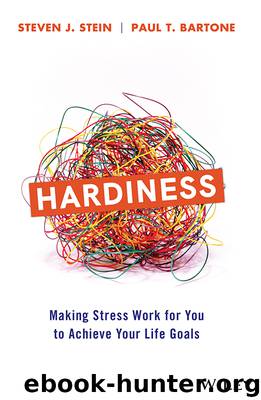Hardiness by Steven J. Stein

Author:Steven J. Stein
Language: eng
Format: epub
ISBN: 9781119584827
Publisher: Wiley
Published: 2019-11-18T17:00:00+00:00
Challenges Versus Hindrances at Work
What happens when you are asked to do something new at work? Are you likely to treat it as a new challenge, something you’re excited about? Or do you see this kind of request as a burden or a hassle that just gets in the way of other work? Some people view any new request at work as a drain on their resources, leading to an increase in work stress. Other people view these requests as new opportunities, or the kind of challenges we have described in previous chapters.
Researchers have built work theories around these perceptions. In one framework, these requests are seen as depleting your resources, adding more stress to your life. In another, some demands are seen as challenges, yet others may be hindrances, or merely interferences with ongoing work. In a study of these two models, researchers have gone one step further, looking at how these kinds of work demands influence workers in two ways—their own sense of self-worth and the perceived meaningfulness of their work (Kim & Beehr, 2019). This then leads to a concept that is described as flourishing—an increase in general positive well-being. Flourishing, more specifically, has been defined as having feelings of competence, positive relationships with others, and having purpose in life. People high in the hardiness mindset are more likely to be in a flourishing state.
Researchers have looked especially at the effects of three categories of work demands. The first is workload. This has to do with how hard you have to work. The second is responsibility. This is where there is a lot that depends on decisions that you make. The third is learning demands. This relates to how much you need to learn in order to improve the knowledge and skills you need to do your job.
Most important in these studies is how workers view the demands that are made of them. If someone asks you to do something, and you appraise or judge it as interesting or challenging, that will lead to one set of effects. If, on the other hand, you view the same requests as annoying, or a hindrance, that can affect you in a completely different way. Your entire sense of self-worth and the meaningfulness of your work can be influenced by how you see these demands, either positively or negatively. One of the surprising findings of the research is how these work demands—and your interpretation of them—can spill over into your personal life outside of work.
While we all want to strive for work-life balance (if there is such a thing!) and leave our work issues in the workplace once we go home, this doesn’t seem to happen. We carry our feelings from work with us into our personal worlds. If we feel excited and challenged by what we have done at work, we’re more likely to be in a good mood and flourish at home. If we are drained and stressed out by our experience at work, we take those bad feelings—along with the health risks they produce—and suffer at home.
Download
This site does not store any files on its server. We only index and link to content provided by other sites. Please contact the content providers to delete copyright contents if any and email us, we'll remove relevant links or contents immediately.
Tools of Titans by Timothy Ferriss(8346)
Change Your Questions, Change Your Life by Marilee Adams(7717)
Deep Work by Cal Newport(7040)
Playing to Win_ How Strategy Really Works by A.G. Lafley & Roger L. Martin(6180)
Man-made Catastrophes and Risk Information Concealment by Dmitry Chernov & Didier Sornette(5980)
Digital Minimalism by Cal Newport;(5740)
Big Magic: Creative Living Beyond Fear by Elizabeth Gilbert(5725)
The Slight Edge by Jeff Olson(5394)
Ego Is the Enemy by Ryan Holiday(5391)
The Motivation Myth by Jeff Haden(5191)
The Laws of Human Nature by Robert Greene(5134)
Stone's Rules by Roger Stone(5065)
Tuesdays with Morrie by Mitch Albom(4753)
Eat That Frog! by Brian Tracy(4499)
Rising Strong by Brene Brown(4431)
Skin in the Game by Nassim Nicholas Taleb(4223)
The Money Culture by Michael Lewis(4173)
Bullshit Jobs by David Graeber(4161)
Skin in the Game: Hidden Asymmetries in Daily Life by Nassim Nicholas Taleb(3973)
